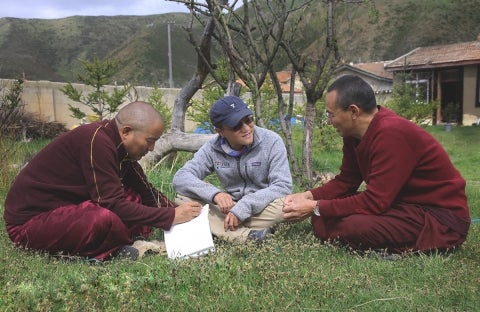Note: Yale School of the Environment (YSE) was formerly known as the Yale School of Forestry & Environmental Studies (F&ES). News articles and events posted prior to July 1, 2020 refer to the School's name at that time.
 Gao Yufang discusses human-wildlife coexistence with Tibetan Buddhist monks in his field site on the Eastern Tibetan Plateau.
Gao Yufang discusses human-wildlife coexistence with Tibetan Buddhist monks in his field site on the Eastern Tibetan Plateau.
Gao shared his talk, “From Conflict to Coexistence: A Paradigm Shift for Human-Wildlife Interaction?” during the Anthropology and Environment Flash Presentation session. He analyzed the discursive shift from “conflict” to “coexistence” in academic and public discussions about how people should live with their wildlife neighbors.
“‘Human-wildlife coexistence’, not unlike the prevalent ‘human-wildlife conflict,’ is a sign that is open to a variety of interpretations depending on the predispositions of interpreters embedded in certain contexts. Each interpretation has its underlying assumptions about the nature of people, wildlife, and their relationship,” he said.
Gao, whose dissertation research examines the conditions of possibility of interspecies coexistence on the Tibetan Plateau, compiled data for this presentation from his long-term participation observation as an active wildlife conservationist and a content analysis of existing multidisciplinary literature on human-wildlife conflict and coexistence. His study suggests that current analytical attention to the social dynamics behind human-wildlife interactions is, at best, fragmentary and incoherent, with an array of ecological, social, and cultural processes overlooked.
“I suggest wildlife conservationists use a problem-oriented, interdisciplinary framework to understand and tackle the complex challenge of human-wildlife coexistence in the Anthropocene.”